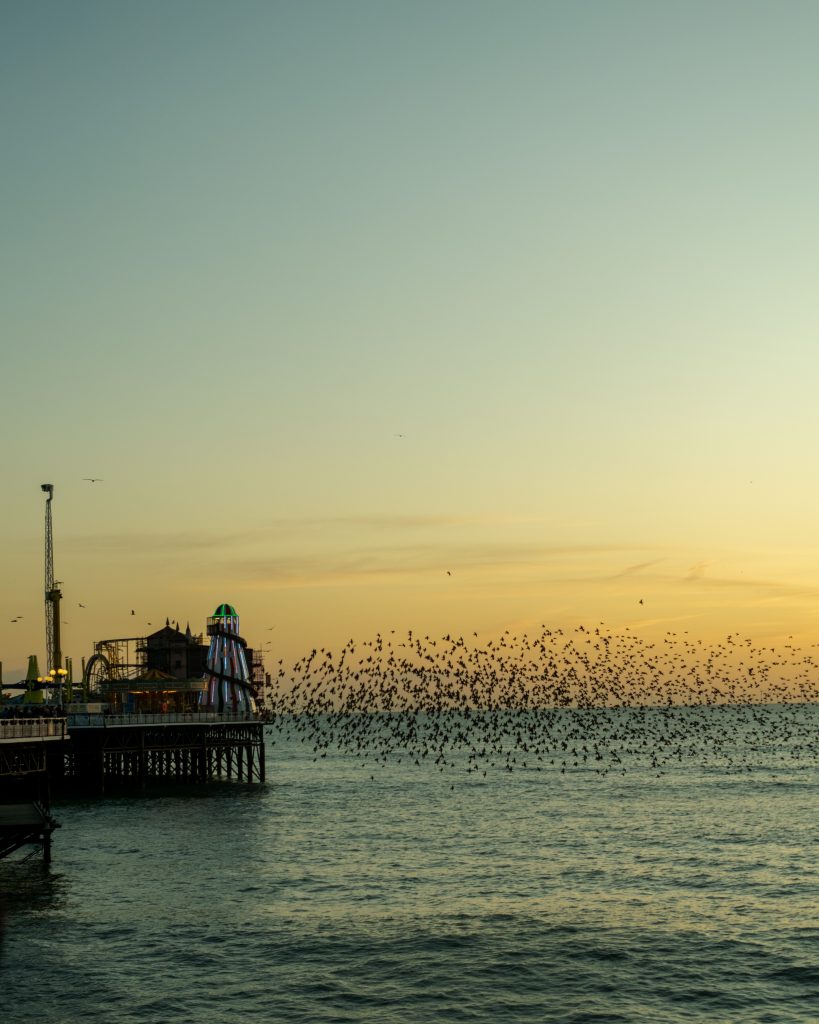
Starlings begin to roost in September but their numbers increase as November passes. The RSPB says:
They mainly choose to roost in places which are sheltered from harsh weather and predators, such as woodlands, but reed beds, cliffs, buildings and industrial structures are also used. During the day however, they form daytime roosts at exposed places such as treetops, where the birds have good all-round visibility.
RSPB Website
Early evening, up to 100,000 birds will rise above their roosts wheeling and turning in tight formations. Starling numbers have been declining because of ‘loss of permanent pasture, increased use of farm chemicals and a shortage of food and nesting sites in many parts of the UK.’2022 was a particularly bad year but, a count in Brighton in March 2023, suggests numbers were considerable up on 2022. (Starling Numbers Up)
See the above RSPB website for more information which also contains video.
Sacred Birds
Starlings were sacred to the Celts and were used for divination by the Romans – their augurs scrutinised the geometric patterns made by the murmurations to interpret the will of the Gods. In the Welsh Mabinogian a starling appears in the story of Bran, God-King of prehistoric Britain and his sister, Branwen, who was married to the King of Ireland.
To cut a long story short, (a version of which you can read on my February 18th’s blog post here), Branwen was banished to the scullery. So she trained a starling to send a message to her brother. He took an army over the Irish Sea to restore her to her rightful state, but Bran was mortally wounded in the battle that followed. He told his companions to cut off his head and take it back to the White Hill, London. His head was as good a companion on the way back as it was on the way out, but the journey home took 90 years. At last they got to London and his head was buried on the White Hill, near the Tower of London, and as long as it were there Britain was safe from invasion. This was one of the Three Fortunate Concealments and is found in ‘the Triads of the Island of Britain.’
I am giving a Walk on the Myths, legends, and Archaeology of London, for London Walks on 4th February.
Shakespeare and Starlings
Shakespeare in Henry IV Part 1 has Hotspur, annoyed with Bolinbroke say:
I’ll have a starling shall be taught to speak nothing but ‘ Mortimer,’ and give it him
Now if you think the idea of a talking starling is nonsense have a look at this video.
Discover more from And Did Those Feet
Subscribe to get the latest posts sent to your email.

Amazing!
I thought parrots and mynah birds were the only ones who can sing.
So I looked up starlings and found out that, unlike the others, their life spam is very short: only 2-3 years.
Which makes it even more remarkable!
After I first posted the piece, I found a video on youtube video which shows a starling speaker.
If you go back to the page and look at the bottom.
https://www.chr.org.uk/anddidthosefeet/november-26th-murmurations-of-starlings-queen-branwen/
Thanks. I watched it and was amazed at all the different things they can say…
Only point is how related to situations is their speech? Do they only repeat sentences/ words they’ve learnt or do they use them to express things?
I wrote ‘sing’ instead of ‘ speak’!!!
‘Starlings are every bit as intelligent as other more common pet bird species and can learn to talk. European starlings are accomplished mimics, often copying songs or sounds of other birds and animals (frog calls, goats, cats), or even of mechanical sounds. According to some, starlings can talk better than parrots. ‘
https://www.thesprucepets.com/european-starlings-390853
and
‘I live in the United States where the only non-protected birds are pigeons, house sparrows and starlings. This is because they are non-native species. Due to their status, they are the only wild birds that can be kept as “pets”. I’ve been helping some local folks who rehab songbirds by rehabbing starlings (they don’t particularly like starlings). I raised Chur and he was the only one I have not released into the wild. I kept him because I recognized an uncommon intelligence as an early fledging. It’s been a remarkable experience. He has a fairly large vocabulary and even makes up his own “sentences”. He also figured out how to escape his cage by opening the gate within a few days. These birds are hugely under-appreciated here in the US. I intend to change that by educating those who will watch the documentary I’m producing.’
https://www.birdforum.net/threads/starling-intelligence.19742